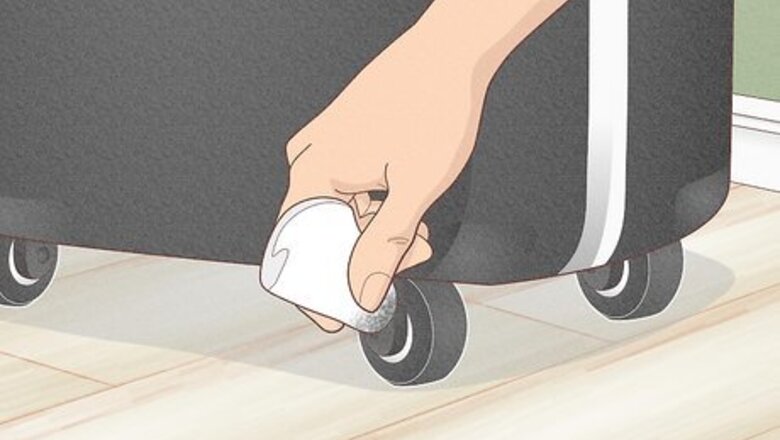
views
- Clean your wheels to make sure they really need replacing: they may just be caked with dirt.
- If your wheel still doesn’t work, observe your luggage to see if needs a riveted wheel or a screwed wheel, as well as the wheel size, and buy a replacement wheel.
- To replace a screwed wheel, unscrew the original wheel from the luggage, and replace it with your new wheel.
- Use a hacksaw and PPE to replace a riveted wheel: saw through the luggage rivet, remove the old wheel, and replace it with the new wheel.
Prepping Luggage for Wheel Replacement
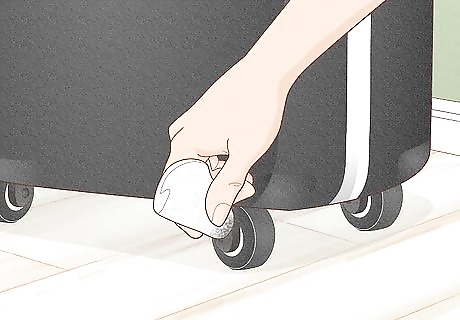
Clean your wheels to make sure they aren't malfunctioning due to dirt. It’s possible your wheels don’t actually need to be replaced: sometimes wheels don't work because they're caked with dirt or debris. Clean the wheel with a damp cloth and look for anything wedged in the wheel before writing it off as unfixable. You may find that thoroughly cleaning the wheels and removing anything lodged in them fixes the problem. If it turns out your wheels are beyond repair, washing them will give you a clean surface to work with as you replace them.
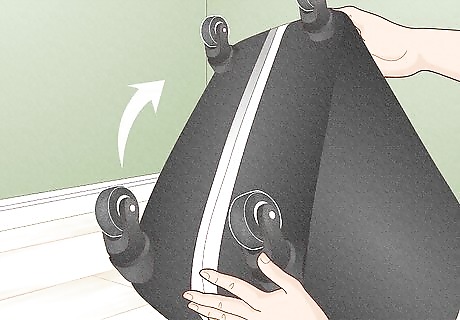
Turn your luggage upside down on a flat surface to work on it. Choose a surface where your luggage can lay evenly while you work—a table or countertop is ideal. Flip your luggage with the wheels facing up so you can get a clear look at each broken wheel while you work on it. If you have to make an emergency replacement while on the go, laying the luggage on the ground can work as well.
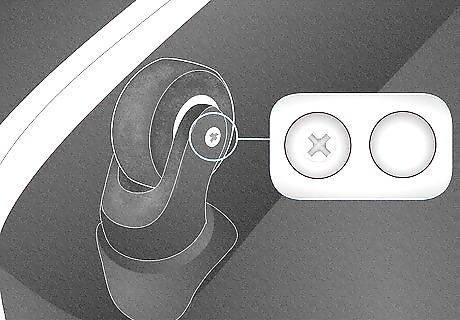
Determine whether your luggage wheels are screwed or riveted. Screwed and riveted luggage wheels are attached in different ways (meaning the replacement process will be different). Screwed wheels are attached by small screws on both sides, whereas riveted wheels are bolted on through the center. Knowing what type your wheels are will help you purchase the right repair materials.
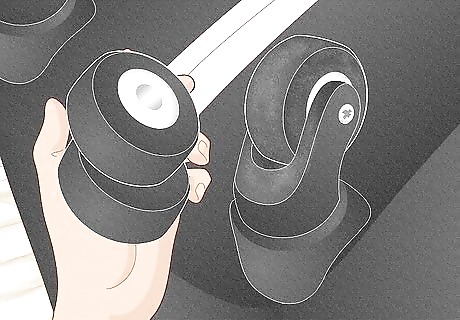
Purchase a wheel that's the same size and brand as the old one. Your replacement wheel will attach and work best if it's the same type as the original wheel. If you're not sure what model your luggage wheel is, contact its manufacturer for details. Buying the wrong-size wheel can make installation impossible or cause the luggage to tilt from the uneven wheel sizes. You may be able to use roller blade wheels as an alternative to replacement wheels. Look for roller blade wheels that are approximately the same size as your old wheel.
Replacing Screwed Luggage Wheels
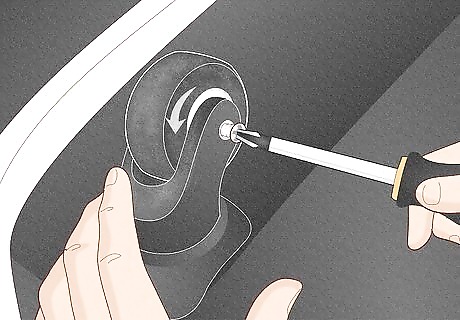
Unscrew any screws securing the wheel in place. Inspect the wheel for screws, then use a screwdriver to take out any screws securing the wheel. If the screws are undamaged, set them aside—although your replacement wheel likely came with screws, you can use your old screws if needed. You may have to open your suitcase and unzip the liner to access the nut bolts holding the screws in place.
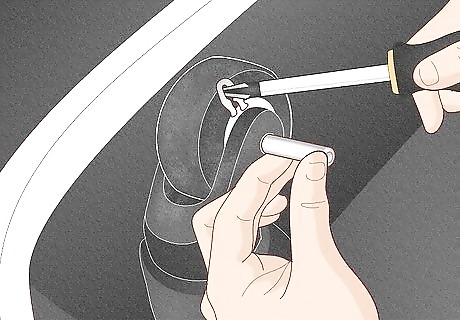
Push out the clip securing the wheel to the luggage. Once you've unscrewed the luggage, the only thing keeping the wheel to the luggage should be a small metal clip attached to a bolt on either side. The clip is usually located in the center of the wheel. Pull out the clip and bolts, setting them aside next to the screws.
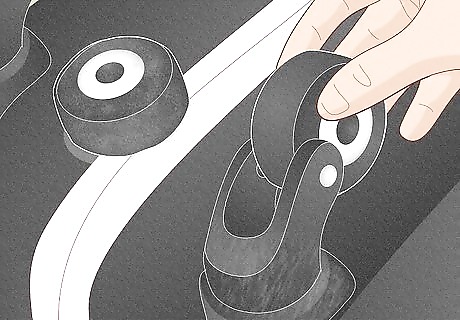
Remove the old wheel and replace it with the new wheel. Take the old wheel out and dispose of it. Place the new wheel into the wheel well and test its placement. If it feels secure, you can screw the wheel into the luggage. The wheel well is the hole left by the old wheel after you remove it. If the wheel feels too tight or loose, you may have chosen the wrong wheel size.
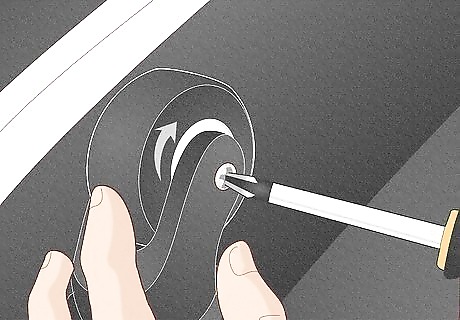
Clip and screw the wheel into the luggage. Put the bolts on both sides of the wheel and slide the clip through to secure them. Use your screwdriver to tighten any screws back in place. Test the new wheel by rolling the luggage back and forth—if it glides smoothly, you have replaced the wheel correctly. If the wheel feels wobbly, try tightening the screws. You may have chosen the wrong wheel size if it still feels wobbly or does not move.
Replacing Riveted Luggage Wheels
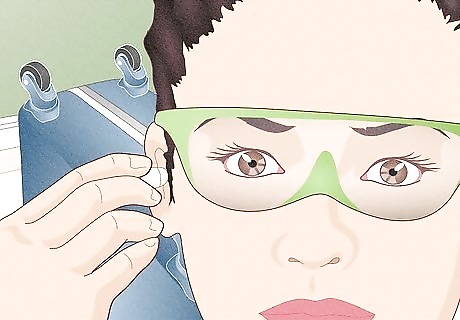
Put on safety goggles and ear protection. Riveted luggage wheels require a hacksaw to replace. Before handling a hacksaw, put on a pair of safety goggles to protect your eyes. If you have sensitive ears, put in ear plugs or a pair of noise-canceling headphones. Of the 2 types, riveted luggage wheels are more difficult to replace than screwed luggage wheels.
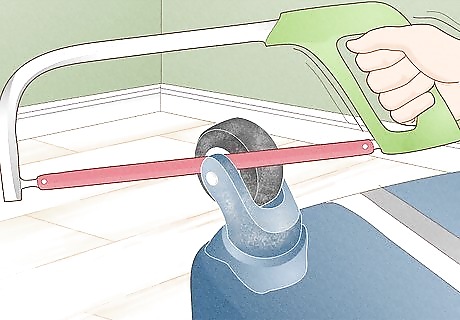
Saw completely through the luggage rivet using a hacksaw. Slice through the end of the luggage rivet with your hacksaw. Use a screwdriver or your hands to pull apart the old rivet and the bearings or washers holding the wheel in place. Remove the old luggage wheel from the wheel well as well. Unlike the bearings or washers, however, you can discard the wheel. Set the bearing and washers aside for use while installing the new wheel.
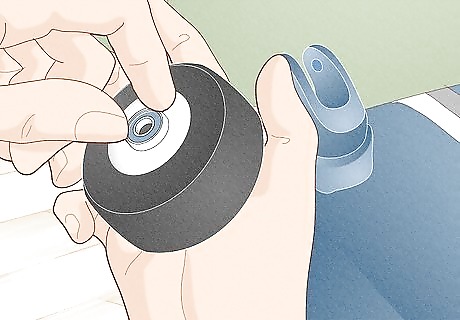
Place the old bearings into the new luggage wheel. Put 1 bearing on each side of the luggage wheel. These will help keep the wheel in place as you install it into the wheel well.
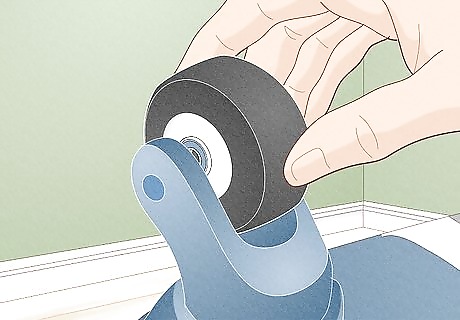
Insert the new wheel into the luggage. Put the replacement wheel into the wheel well, then slide a 2 in (5.1 cm) screw through the luggage wheel and bearing. Place a washer on both sides of the screw to secure it in place.
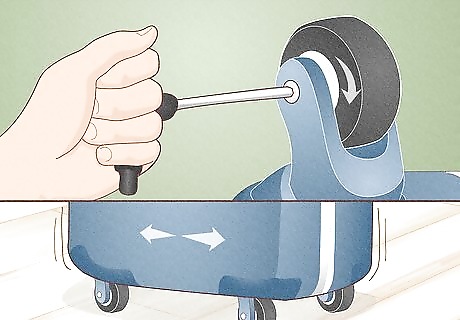
Tighten the nut and test the new wheel. Screw a nut into the end of the screw to finish securing the new wheel. Test its fit by moving the luggage back and forth over a flat area. If the luggage glides smoothly, it is the right fit for your luggage. If the luggage is too wobbly, try tightening the nut more. Your wheel may be the wrong size, however, if the wheel cannot move or still feels wobbly after tightening it. But don't tighten the nut too much, or else it may affect your wheel's mobility.
















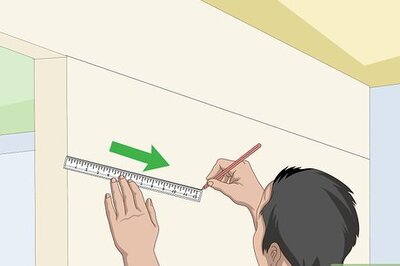


Comments
0 comment